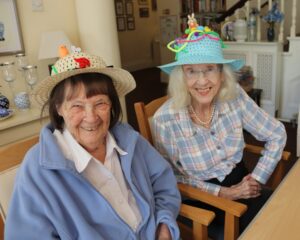Blue Monday
The third Monday of January has been dubbed Blue Monday due to a combination of post-Christmas blues, cold dark nights and the thud of unpaid Christmas credit card bills on the doormat. A mathematical formula was even used to precisely calculate the most depressing day of the year.
Supposedly the date was calculated using many factors, including: weather conditions (W), debt level (d: the difference between debt accumulated and our ability to pay), time since Christmas (T), time since failing our new year’s resolutions (Q), low motivational levels (M) and feeling of a need to take action (Na).
Actually, the dubious-sounding ‘equation’ turned out to be a rather elaborate PR stunt by Sky Travel in 2005, hoping to encourage people to book a winter holiday in the sun!
But in reality, these short, dark days, coupled with overspending and general blues is a perfect storm for depression, especially in older people for whom health problems and lack of mobility often mean getting out and about at this time of year is much harder. This can lead to feelings of loneliness and isolation – even depression. Older people are already more vulnerable to mental health problems and depression affects around 22% of men and 28% of women aged 65 years and over.
But the cold weather and dark days needn’t be an excuse not to have fun – and here at Birchwood House we have plenty going on to keep the blues at bay, maintain energy levels and promote mental engagement and wellbeing. Our residents enjoy lively board games, art and craft activities as well as twice a month ‘Music For Health’ sessions, which can get especially noisy! And to boost our mood and promote self-care, especially vital at this gloomy time of year, we have weekly visits from a hairdresser and a chiropodist.
If you find the winter blues are affecting you, don’t be afraid to reach out for help or support – and don’t forget, the shortest day of the year is already behind us!
Other articles you may like
- Why Human Connection is Important for the Elderly
 Why Human Connection is Important for the Elderly Social connections are an integral part of human life, whether it’sContinue reading “Why Human Connection is Important for the Elderly “
Why Human Connection is Important for the Elderly Social connections are an integral part of human life, whether it’sContinue reading “Why Human Connection is Important for the Elderly “ - Sticky Toffee Pudding
 Sticky Toffee Pudding Sticky toffee pudding (or sticky date pudding) is a date-filled dessert and classic English-style pudding, consistingContinue reading “Sticky Toffee Pudding”
Sticky Toffee Pudding Sticky toffee pudding (or sticky date pudding) is a date-filled dessert and classic English-style pudding, consistingContinue reading “Sticky Toffee Pudding” - Egg-citing Easter Activities for the Elderly
 Egg-citing Easter Activities for the Elderly With Easter approaching, now is wonderful time to create lasting memories with yourContinue reading “Egg-citing Easter Activities for the Elderly “
Egg-citing Easter Activities for the Elderly With Easter approaching, now is wonderful time to create lasting memories with yourContinue reading “Egg-citing Easter Activities for the Elderly “ - Easy weeknight recipe for chicken in white wine sauce
 Chicken in white wine wauce This creamy chicken dish is both light yet hearty, making it a great mealContinue reading “Easy weeknight recipe for chicken in white wine sauce”
Chicken in white wine wauce This creamy chicken dish is both light yet hearty, making it a great mealContinue reading “Easy weeknight recipe for chicken in white wine sauce” - 5 Step Banana Pavlova
 5 Step Banana Pavlova This banoffee-inspired Banana Pavlova is crunchy, soft, and sweet all at once. It’s best describedContinue reading “5 Step Banana Pavlova”
5 Step Banana Pavlova This banoffee-inspired Banana Pavlova is crunchy, soft, and sweet all at once. It’s best describedContinue reading “5 Step Banana Pavlova” - Why is continence care important for care homes
 Why is continence care important for care homes Continence care can become more relevant with age as incontinence isContinue reading “Why is continence care important for care homes”
Why is continence care important for care homes Continence care can become more relevant with age as incontinence isContinue reading “Why is continence care important for care homes” - The Best Chocolate Brownies
 The Best Chocolate Brownies One of our favourite desserts here at Birchwood House is this deliciously creamy lemon posset.Continue reading “The Best Chocolate Brownies”
The Best Chocolate Brownies One of our favourite desserts here at Birchwood House is this deliciously creamy lemon posset.Continue reading “The Best Chocolate Brownies” - The new Care Quality Commission Assessment Framework
 The new Care Quality Commission assessment framework The Care Quality Commission (CQC) is the independent regulator of health andContinue reading “The new Care Quality Commission Assessment Framework”
The new Care Quality Commission assessment framework The Care Quality Commission (CQC) is the independent regulator of health andContinue reading “The new Care Quality Commission Assessment Framework” - Bringing festive joy into our care home
 Bringing festive joy into our care home As November transitioned into December, the Birchwood House team continued to createContinue reading “Bringing festive joy into our care home”
Bringing festive joy into our care home As November transitioned into December, the Birchwood House team continued to createContinue reading “Bringing festive joy into our care home”



